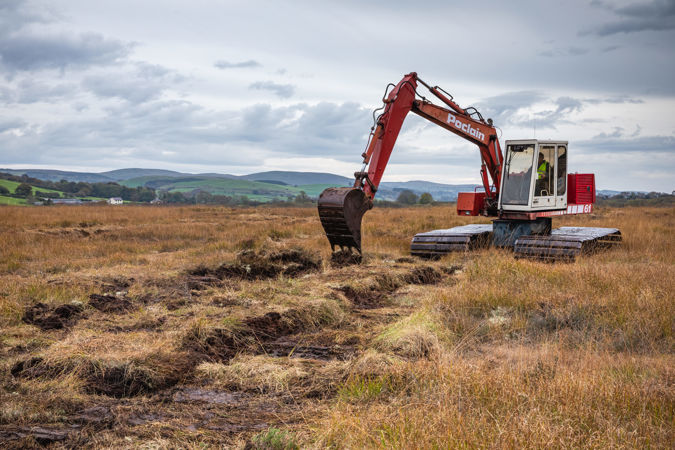Peatland restoration project on course to support climate recovery

As world leaders gather in Glasgow to begin crucial climate change discussions a Natural Resources Wales’ project aimed at capturing and storing carbon in our landscapes is already playing a key role in helping Wales to achieve its net zero ambitions.
The EU LIFE programme funded LIFE Welsh Raised Bogs Project has carbon storage, and environmental resilience at its core, and is a great example of climate recovery in action.
The project is the first national restoration programme for raised peat bogs and for any peatland habitat in Wales. It aims to restore seven raised bog sites in Wales to a better condition.
The work will include improving the conditions of the peatland preventing water from escaping from the bogs and at the same time restoring natural water levels. The project is also removing invasive species like Molinia grass and small trees that are taking over on the sites and drying out the raised bogs.
The United Nations Climate Change Conference (COP26) will bring global nations together to accelerate action towards the goals of the Paris Agreement and the UN Framework Convention on Climate Change.
Climate action, building resilience and lowering CO2 emissions are just some of the priorities being discussed at this year’s conference, and these priorities are also reflected in the LIFE Welsh Raised Bogs Project.
The UK’s peatlands store over three billion tonnes of carbon, around the same amount as all the forests in the UK, France and Germany put together.
Healthy peatlands can safely lock up vast amounts of carbon, while providing other vital benefits that help us become more resilient, such as flood prevention, clean water and improved health and wellbeing.
But peatlands are struggling. Globally we know that 25% of peatlands have been destroyed, whilst in the UK at least 80% are damaged.
Unfortunately, lowland raised bogs are the most threatened peatland with only 6% remaining, the majority is in unfavourable and degraded condition and in need of restoration.
The LIFE Welsh Raised Bogs Project aims to improve 900 hectares (4 square miles) of degraded peatland to a healthier condition. The main aims are to:
- ensure carbon is stored and locked back into our peatlands
- help store and purify more water
- create conditions for rare and unique plants and wildlife such as the rosy marsh moth, sundews and sphagnum species (bog moss) to thrive
- create a healthy natural environment for people to enjoy
Patrick Green, the LIFE Welsh Raised Bogs Project Manager said: “If raised bogs are not in good condition, they release harmful carbon dioxide into the atmosphere. When they are in good condition, they store carbon and absorb it from the atmosphere.
“The restoration and conservation work done by the project is helping to improve the condition of our peatlands in Wales, and as a result we are leading the way in the fight against climate change.”
